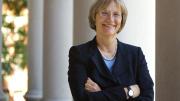Harvard is inherently global. Founded in 1636 by men born an ocean away, Harvard College was intended to enshrine knowledge as a critical dimension of European outreach and exploration. Today the University is building on nearly four centuries of tradition and strength as it embraces a world in which people and ideas move with increasing rapidity and ease. For nearly two years now, we have been involved in a University-wide discussion about how Harvard can most effectively seize the opportunities offered by the changing realities around us, and I wanted to share with you some of the details of our emerging global strategy.
We began by considering our distinctive strengths, chief among them the opportunity for intense study, supported by eminent faculty and outstanding library and museum resources, of a wide representation of geographic areas. The University is home to nearly 80 research centers and academic programs focused on global issues or on specific countries and regions, and offers instruction in more than 70 languages. Enhancing these intellectual strengths is subject- and problem-based engagement that draws on region-based resources. In global health, for instance, we combine expertise across our Schools in fields like medicine, humanities, business, and law with area-specific knowledge to enhance understanding of the cultural contexts in which our efforts are located.
The University’s international connections—including some 50,000 alumni in all but five of the world’s countries—contribute significantly to our ability to attract the best students, faculty, and staff, and our campus must remain a hub for the world’s great thinkers and doers. As we encourage faculty to envision their work and its impact with the broadest perspective possible, we will continue to expand opportunities for students to situate their knowledge and understand their lives in a global context. With the support of a generous gift from David Rockefeller, we hope to ensure that every undergraduate has a significant international experience. At the same time, we are enhancing curricula across the University to underscore the importance of global citizenship. A portion of the Business School’s FIELD program, to share just one example, is an international placement for all MBA students at the beginning of their second semester. The understanding gained through immersion is unique, and we must continue to explore ways to make international experiences part of the Harvard experience.
In an era in which knowledge is the world’s most valuable resource, we seek to create the largest intellectual footprint with the smallest physical footprint. Rather than selecting one or two locations for the disproportionate attention and investment required to build a campus, we want to try to support the engagements that emerge from the widely distributed interests of dozens of faculty across all our Schools. But we also recognize the wisdom of identifying a few programs in specific countries or regions as University commitments and foci for central support, with the goal of representing the intersections of Harvard’s international depth and breadth while uniting and multiplying our collective strengths. Maintaining our core values of academic freedom and autonomy, inclusiveness and opportunity, as we pursue these goals will be as essential abroad as it is at home.
Efforts to expand our reach and sustain collaborations will be strengthened through digital connections. The exploding demand for higher education far exceeds anything that a single institution or even a proliferation of physical campuses could possibly supply. Through edX, our online education partnership with MIT, Harvard will develop a robust digital presence that can work like the ripple of a pebble in a pond, creating ever-expanding opportunities for learning and teaching that have not been available to our predecessors. I was struck by the huge demand for knowledge in public health when I was traveling in India in January. With a new online course on the principles of biostatistics and epidemiology just launched, we have the potential to meet part of that demand.
Harvard will become more intentionally global in the years to come, uniting and leveraging its extraordinary intellectual and programmatic strengths to ensure that our teaching and research have the optimal potential to make a positive difference. What we do next will have an impact not just on the University’s future, but on the world’s future, a future in which knowledge and education will play an ever more important role.
Sincerely,
Drew Faust






